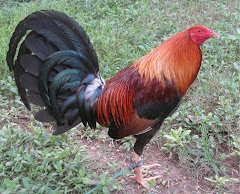Chickens in religion
Chickens, Indonesia
In Islam, The Messenger of Allah said, "When you hear the crowing of cocks, ask for Allah's Blessings for (their crowing indicates that) they have seen an angel. And when you hear the braying of donkeys, seek Refuge with Allah from Satan for (their braying indicates) that they have seen a Satan." Sahih Al-Bukhari Vol. 4, Book 54, Number 522: Narrated Abu Huraira.
In Indonesia the chicken has great significance during the Hindu cremation ceremony. A chicken is considered a channel for evil spirits which may be present during the ceremony. A chicken is tethered by the leg and kept present at the ceremony for its duration to ensure that any evil spirits present during the ceremony go into the chicken and not the family members present. The chicken is then taken home and returns to its normal life.
In ancient Greece, the chicken was not normally used for sacrifices, perhaps because it was still considered an exotic animal. Because of its valour, the cock is found as an attribute of Ares, Heracles, and Athena. The alleged last words of Socrates as he died from hemlock poisoning, as recounted by Plato, were "Crito, I owe a cock to Asclepius; will you remember to pay the debt?", signifying that death was a cure for the illness of life.
The Greeks believed that even lions were afraid of cocks. Several of Aesop's Fables reference this belief. In the cult of Mithras, the cock was a symbol of the divine light and a guardian against evil.[citation needed]
In the New Testament, Jesus prophesied the betrayal by Peter: "Jesus answered, 'I tell you, Peter, before the rooster crows today, you will deny three times that you know me.'" (Luke 22:34) Thus it happened (Luke 22:61), and Peter cried bitterly. This made the cock a symbol for both vigilance and betrayal.
Earlier, Jesus compares himself to a mother hen when talking about Jerusalem: "O Jerusalem,
In many Central European folk tales, the devil is believed to flee at the first crowing of a cock.
In traditional Jewish practice, a chicken is swung around the head and then slaughtered on the afternoon before Yom Kippur, the Day of Atonement, in a ritual called kapparos. The sacrifice of the chicken is to receive atonement, for the bird takes on all the person's sins in kapparos. The meat is then donated to the poor. A woman brings a hen for the ceremony, while a man brings a rooster. Although not actually a sacrifice in the biblical sense, the death of the chicken reminds the penitent sinner that his or her life is in God's hands.
The Talmud speaks of learning "courtesy toward one's mate" from the rooster. This might refer to the fact that when a rooster finds something good to eat, he calls his hens to eat first.
The chicken is one of the Zodiac symbols of the Chinese calendar. Also in Chinese religion, a cooked chicken as a religious offering is usually limited to ancestor veneration and worship of village deities. Vegetarian deities such as the Buddha are not one of the recipients of such offerings. Under some observations, an offering of chicken is presented with "serious" prayer (while roasted pork is offered during a joyous celebration). In Confucian Chinese Weddings, a chicken can be used as a substitute for one who is seriously ill or not available (e.g sudden death) to attend the ceremony. A red silk scarf is placed on the chicken's head and a close relative of the absent bride/groom holds the chicken so the ceremony may proceed. However, this practice is rare today.









